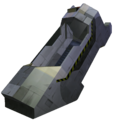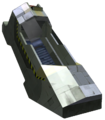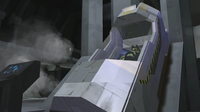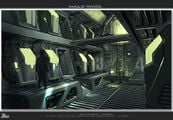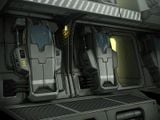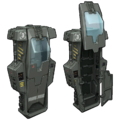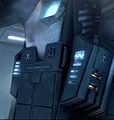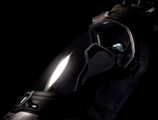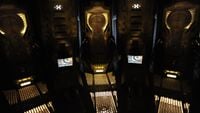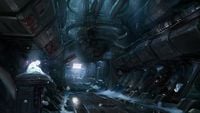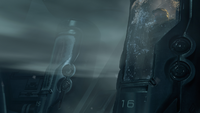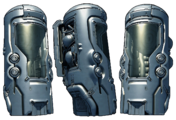Cryo chamber
From Halopedia, the Halo wiki
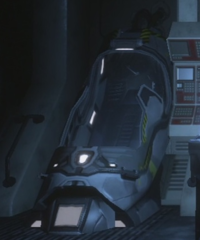
A cryo-chamber, often called a cryotube,[1][2][3] is plastasteel pod with a form-fitting gel bed that allows all of a starship's non-essential personnel to be cryonically frozen for long periods of time, most commonly during prolonged slipspace jumps.[2] An example of this is John-117, who was stored in a cryo-chamber aboard the ship UNSC Pillar of Autumn and later unhatched from the cryosleep chamber by Tech Chief Thom Shephard along with Tech Officer Sam Marcus.
Known models of the cryo-chamber include the Mark VII Personal Suspension Unit, manufactured by Jakubaitis Standard Systems. It was widely disliked by UNSC personnel because of its inferior moisture balancing; this resulted in dry, itchy skin for a day or more after awakening, known as "cryo-itch". It was later replaced by the Mark VIII Cryogenic Suspension Chamber, although many older craft still use the Mark VII.[4]
Cryo chambers are referred to as "the freezer" in slang.[5] Another slang term for the chamber is "the Admiral's wife" because it is a "frosty bed". Being put in cryo is also referred to as being "put on ice."[6]
Technical specifications
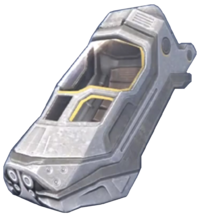
The cryo-chambers are usually stored in a dedicated area of the ship, commonly referred to as a "cryo bay".[1] Cryo chambers are monitored by the ship's AI, and the AI can awaken crew members at a moment's notice. Cryo-computer is designed to change the pharmaceuticals dosage if an individual appears as though they might wake from cryogenic sleep.[7] Cryo wake-up protocols demand that crew check each other to make sure everyone revives from cryo all right. There is usually a medical pod in cryogenics bays for emergency resuscitation situations.[8]
To prevent ice crystals from forming in one's cells, a person going into cryosleep must be injected with a chemical known as cytoprethaline.[9] A substance known as bronchial surfactant must also be ingested to protect the lungs. Individuals in cryo tubes are given a steady supply of pharmaceuticals that control the frequency and duration of cryosleep cycles along with influencing the content of their dreams.[10] While in cryo, humans do not age; as a result many UNSC military personnel, who routinely undergo long stretches of cryosleep during slipspace travel, effectively age slower than most civilians.[11]
Extended periods in cryosleep can result in a condition often called freezer burn which is a pain caused by cryo pharmaceuticals trapped in muscles and joints.[12] People are almost always stored in cryotubes naked, as covered skin generally reacts badly to the cryo process, leaving skin raw and blistered.[13] However, it is possible for Spartans to go into cryo chambers fully armored, using their conditioning and training to ignore the pain.[14] Cadets at Corbulo Academy regularly wore carbon-black skintight clothing during cryo training; the use of these "cryo suits" did not lead to the blistering frequently caused by normal clothing. As of the year 2557, UNSC personnel on at least some ships are given special white jumpsuits to wear when going into cryo.[9]
Entering cryo can also be used as an emergency measure. Often a person may be placed in cryo in order to save them from succumbing to grievous injuries, such as in the case of Linda-058, who was placed in a cryo-chamber after being severely injured during the Fall of Reach, and successfully revived later despite being previously declared clinically dead. Each chamber will hold an individual for as long as necessary, and can be ejected prior to an emergency landing, thus saving some crew from harm to be recovered later. Some pods feature slow-impulse thrusters for limited maneuvering in the event of ejection.[15] After the aft section of the UNSC Forward Unto Dawn was left drifting in space years from rescue, the Master Chief entered cryo sleep in order to survive the wait for rescue. When the UNSC Spirit of Fire was left adrift in space without a slipspace drive, its crew entered cryosleep for 28 years, only to be awakened when the ship unexpectedly arrived at Installation 00.
Trivia
- The slipspace field pod is the Forerunner equivalent to the cryo chamber; these pods use a slipspace stasis field to suspend the occupant in time and to protect them from outside harm. It is unknown whether the Covenant possesses an equivalent of the cryo chamber, as such technology is yet to be mentioned or observed.
- Even though humans must enter a cryo-tube naked or risk being blistered when they emerge, Professor Ellen Anders in Halo Wars and Dr. Catherine Halsey in The Package both entered their tubes fully clothed, while the crew aboard UNSC Spirit of Fire were also fully clothed when emerging from 28 years of cryosleep. These were cases of artistic license, however, since showing nudity would force up both the games' and the short film's rating.
- In Halo: Combat Evolved, it is possible through a glitch to get back inside the tube, and see the Chief, headless.
Gallery
A left-side view of a cryo-chamber on the UNSC Pillar of Autumn in Halo: Combat Evolved.
Concept art of the cryo chambers of the UNSC Spirit of Fire for Halo Wars.
A marine inside a cryo-chamber.
Catherine Halsey in a cryo-chamber, fully clothed, in Halo Legends: The Package.
John-117 inside a cryo-chamber in an Easter egg in Halo: Reach.
John-117 in a cryo-chamber in Halo: Combat Evolved Anniversary.
Some cryo-chambers at Corbulo Academy of Military Science in Halo 4: Forward Unto Dawn.
Panoramic view of the UNSC Forward Unto Dawn cryo-bay in Halo 4: Forward Unto Dawn.
Concept art of the cryo-bay on the Forward Unto Dawn for Halo 4.
Cortana giving the command to thaw the Master Chief.
Jacob Keyes exiting a cryo chamber on-board the Han in Halo: The Fall of Reach - The Animated Series.
Spirit of Fire crew exiting cryo-chambers in Halo Wars 2.
The Pillar of Autumn cryo chambers in Halo: The Master Chief Collection.
List of appearances
Sources
- ^ a b Halo: Combat Evolved, campaign level The Pillar of Autumn
- ^ a b Halo: First Strike, page 150 ("John brushed off the frost buildup that clouded the top half of the cryotube, and revealed the green-armored figure sprawled behind the plastasteel shell.")
- ^ Halo: Infinity, Invasion
- ^ Halo Encyclopedia (2009 edition), page 216
- ^ Halo: The Fall of Reach, page 102
- ^ Halo: The Cole Protocol, page 21
- ^ Halo: Contact Harvest, page 60 ("The cryo-computer observed a surge of activity in Avery’s brain-an effort to yank himself out of REM-and upped his dosage.")
- ^ Halo: The Fall of Reach, page 14 (2001 edition)
- ^ a b Halo 4: Forward Unto Dawn
- ^ Halo: Contact Harvest, page 60
- ^ Halo: New Blood, page 17 (Google Play edition)
- ^ Halo: Contact Harvest, page 107
- ^ Halo: The Flood, page 20
- ^ Halo: The Flood, page 21
- ^ Halo: First Strike (2010), Adjunct
